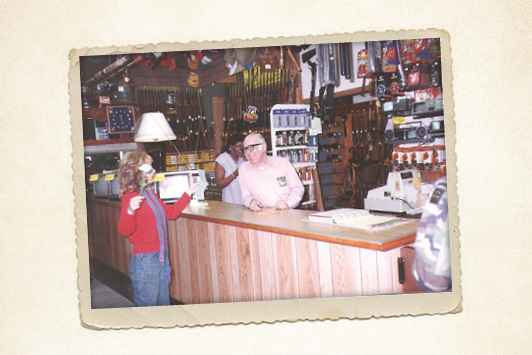
At 103, Leonard Levenson may have officially retired from the pawn business, but his love for this trade keeps him engaged and consulting with colleagues even today.
Levenson began pawnbroking at nearly 40, but his entrepreneurial spirit formed decades earlier. By age 15, he had found work at a loan office in Rock Hill, South Carolina, lending money to hosiery-mill workers. He found other successful ventures before enlisting in the marines when World War II began in 1939. After the war ended, he found work in New York’s garment district for a ladies’ wear manufacturer. But the marines called him to serve stateside during the Korean War, which lasted from 1950 to 1953. Honorably discharged, Levenson found himself broke and needing work. So the South Carolina native headed back down south, landing at the Raleigh Loan Office in North Carolina: a pawnbroker that specialized in buying silverware in New York and reselling it to a southern society that revered fine tableware.
In 1957, working at Siegel’s Pawn Shop in Newport News, Virginia, he met “the most beautiful woman I’d ever seen” — a young widow, Lillian, whom he married. Siegel’s became the after-school playground for his stepdaughter, Roslyn Zelenka, igniting in her a lifelong love for jewelry. She would try on rings and watch a bench jeweler create gold charms just for her.
“I still have those charms, which turned out to be things I liked later in life,” relates Zelenka. In fact, she’s now the owner and designer of Rainforest Design in Panama, which creates hand-carved cameo jewelry.
Going it a-loan
The location of Siegel’s meant Levenson’s customers were military or local civilians trading jewelry, musical instruments, and various firearms. When the store closed, he went to Parker Music & Pawn — now Parker Pawn & Jewelry — of Fayetteville, North Carolina, in 1976. Melanie Solomon-Keefe, daughter of Parker owner Ron Solomon, remembers hearing Levenson had opened their Spring Lake, North Carolina, location while the family was on vacation. A secretary’s panicked call to Solomon begged him to come home urgently. “Leonard has loaned out all our money,” the secretary cried.
Sure enough, Levenson had acquired a “ton of merchandise in pawn that he’d loaned money on,” Solomon-Keefe recounts fondly. “Grandpa Leonard,” as she calls him, “had loaned out all the money and put other stores out of the pawn business” by taking all their customers.
Fayetteville became Levenson’s final career stop before his official retirement in 1991, when he and Lillian moved to Atlanta, Georgia, to be near family. She died five months later.
Diamonds and tombstones
Along the way, Levenson amassed a bonanza of tales from the business. In the early years, he kept filing cabinets full of newspaper and magazine clippings with pictures and information that served as a reference for what things were worth — a database of sorts. Today, Levenson is aware, everything
is electronic.
Pawn shops rely on people needing immediate cash, and stories of what they bring in are legion. The saddest story he recalls was a woman who came in so broke, she didn’t have a dime to get on the bus. “She didn’t have anything to pawn, either,” he remembers. So Levenson just gave her a suitcase. Other times, his transactions were downright comical. “Once, I took in a customer’s live pet raccoon,” he chuckles.
A pawnshop is still a place to find the uncommon. Levenson says his most unusual pawned article was an unmarked tombstone. Pawned items can also reveal emotional upheaval. “On Monday mornings, women and men would come in to pawn their wedding bands after a disagreeable weekend. By the next weekend, they came back to get them.”
Diamonds, he says, are a beautiful and portable commodity, especially during wartime. “People could hide them by sewing them into their clothes.”
Still in the game
Official retirement hasn’t stopped Levenson. Solomon-Keefe, who began working in the family pawn business after Levenson retired, relates that “we recently had a customer come in wanting to know where Leonard was, and could he help them. We explained that he had retired, and the customer said, ‘Well, no one else will let me borrow a lawn mower.’ This is the kind of person he is.”
Following his retirement, he would still come in and check on things a few days a week, offering advice and opinions. Now he keeps in touch with daily calls to talk shop. “He checks to make sure we have the correct decorations out, correct product out for sale, and good sales going on. He consistently talks about overhead and inventory and watching those numbers,” she says. “Today he FaceTimed the Spring Lake location and asked them to take him to the jewelry showcase so he could see the cases and approve. Grandpa never stops working, which has kept his mind super sharp. I wish he still lived in Fayetteville.... We miss him dearly.”
His advice for anyone starting out in the pawn business today? “If you have enough money and have a good location, it’s a good idea.”
Image: Leonard Levenson
helps a customer on military payday at Parker Pawn & Jewelry’s Spring Lake
location, 1986.Article from the Rapaport Magazine - September 2019. To subscribe click here.